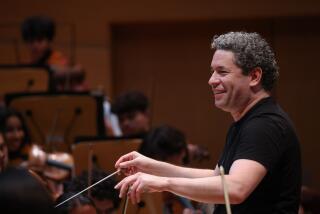ARTIST RECALLS FRIENDSHIP WITH COMPOSER : ORGANIST TO PLAY DURUFLE’S REQUIEM
- Share via
Organist Frederick Swann modestly plays down his side of a close friendship with the late composer Maurice Durufle.
“I got to know the Durufles when they made their first trip to the United States in 1964,” Swann said in a recent phone interview.
“I played the Requiem and all of his organ music (at the Riverside Church in New York). This made them feel kindly to me and a friendship developed.”
Swann estimated that by now he has played Durufle’s Requiem--his most well-known work--79 times.
“As with anything that you get to know over a period of time, especially a beautiful and complex work like the Requiem, you discover new beauties and complexities. But that doesn’t give me any inside track on the music,” he said.
Swann recalled being terrified when he first played the work for Durufle.
“I had taken a lot of liberties. I had gone to the orchestral score and duplicated some of its effects. He was very perplexed at the beginning hearing all these (orchestral) lines. But he encouraged me and later made suggestions for additions.”
Swann will give performances 80 and 81 of the Requiem at 3 p.m. and 7 p.m. on Sunday when he accompanies the Master Chorale of Orange County under Maurice Allard at St. Andrew’s Presbyterian Church of Newport Beach. (The program will consist entirely of French music from the 16th to the 20th centuries.)
Swann had been organist at the Riverside Church from 1958 until coming to the Southland a little more than four years ago. (He now is director of music and organist at the Crystal Cathedral in Garden Grove.) He began corresponding with Durufle after their meeting and eventually began visiting the composer and his wife in Paris.
“I didn’t spend months studying with them, as many Americans did, because I was too old and established in a position. That made it impractical. Still, we discussed a great deal of his music.
“In conversations,” Swann said, “he always would be very retiring and difficult to draw out: If you could get him started, it would be fine. But he spoke no English.
“Mrs. Durufle was outgoing and liked to practice her English. She was the live wire of the family. And she is a fine organist.”
Sadly, the composer’s last years were painful ones: He was severely injured in an automobile accident in May, 1975, according to Swann.
“Their car was hit by a drunken driver head-on at 100 miles an hour,” Swann said.
“Both (he and his wife) were badly mangled. It’s a miracle they survived at all. (Madame Durufle) has had over 20 operations, with one or two more to go.”
Durufle died in June, 1986, leaving behind a rather modest amount of music, Swann said.
“There are only a few pieces--eight or 10--for the organ, a few motets for choir, a few orchestral things. He labored over his music so much, refining everything he composed. . . .”
His Requiem, composed in 1947, was based on Gregorian chants. Durufle wanted, he wrote, “to reconcile . . . the very flexible Gregorian rhythms . . . with the exigencies of modern notation.”
Like the Faure Requiem, Durufle’s work is meant to console the bereaved.
“It comforts and uplifts, rather than terrifies,” Swann said. “They both omit the ‘Dies Irae’ (Day of Judgment). But the Faure is almost childlike compared with the complexities of the Durufle score.
“His style is tuneful and melodic, a combination of the romantic and the contemporary. You won’t encounter enormous discords or tone clusters. But there’s nothing sentimental or cloying. I find it very exciting.”
More to Read
The biggest entertainment stories
Get our big stories about Hollywood, film, television, music, arts, culture and more right in your inbox as soon as they publish.
You may occasionally receive promotional content from the Los Angeles Times.










